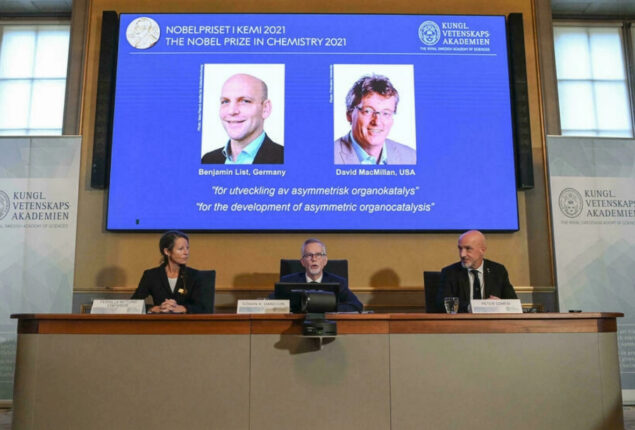Trump insists for 2019 Noble Prize
United States (US) President Donald Trump believes he was robbed by the...

Benjamin List and David MacMillan wins the Noble Prize for their work on catalysts
Here is a list of the recipients of the Nobel Chemistry Prize throughout the past decade, prior to Wednesday’s announcement of the 2022 award.
Benjamin List (Germany) and David MacMillan (United States) for developing a precise molecular construction tool known as asymmetric organocatalysis.
Emmanuelle Charpentier (France) and Jennifer Doudna (United States) for creating the gene-editing method known as CRISPR-Cas9 DNA snipping “scissors.”
John Goodenough (United States), Stanley Whittingham (United Kingdom), and Akira Yoshino (Japan) for the development of lithium-ion batteries, which paved the path for cell phones and a society without fossil fuels.
Frances H. Arnold (United States), George P. Smith (United States), and Sir Gregory P. Winter (United Kingdom) in 2018 for inventing enzymes for greener, safer chemistry and antibody medicines with fewer side effects.
2017: Jacques Dubochet (Switzerland), Joachim Frank (United States), and Richard Henderson (United Kingdom) for cryo-electron microscopy, a technique for studying microscopic, frozen molecules.
2016: Jean-Pierre Sauvage (France), Fraser Stoddart (United Kingdom), and Bernard Feringa (Netherlands) for creating molecular machines, the smallest devices in the world.
2015: Tomas Lindahl (Sweden), Paul Modrich (United States), and Aziz Sancar (Turkey-United States) for their research into how cells repair damaged DNA.
2014: Eric Betzig (United States), William Moerner (United States), and Stefan Hell (Germany) for the advancement of super-high-resolution fluorescence microscopy.
Martin Karplus (US-Austria), Michael Levitt (US-Great Britain), and Arieh Warshel (US-Israel) in 2013 for developing computer models to simulate chemical processes.
2012: Robert Lefkowitz (United States) and Brian Kobilka (United States) for research on G-protein-coupled cell receptors.
Catch all the World News, Breaking News Event and Latest News Updates on The BOL News
Download The BOL News App to get the Daily News Update & Follow us on Google News.